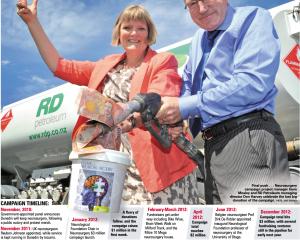What is the biggest challenge of setting up New Zealand's first academic neurosurgery unit?
The biggest challenge for setting up the first academic neurosurgery unit in Dunedin is related to getting all the necessary collaborations set up with basic and clinical neuroscientists as well as with the other neurosurgeons of New Zealand. My research domain consists of non-invasive and invasive neuromodulation (modifying brain function via electrical or magnetic stimulation). This requires input and help from a lot of other disciplines.
This could be as diverse as clinical neurophysiologists, psychologists, basic neuroscientists as well as specialists related to the specific domain of investigation, for example psychiatrists (addiction), neurologist (memory) and other neurosurgeons for outcome analysis in neurosurgical treatments. This will require some time, but I have a feeling that both clinical scientists and basic neuroscientists are open-minded in Dunedin and interested in a translational neurosurgical research programme.
My clinical appointment will involve surgical treatments and clinics. My expertise lies in the surgical treatment of acoustic neuromas, pituitary tumours and skull base surgery.
Your new role sounds demanding in terms of the teaching, clinical and research elements. Is that daunting, or similar to any job at your level?
The multiple demands are normal for any academic position and my appointment has been split in a 50% clinical position and 50% academic position, permitting me to fulfil all the demands.
Is there a particular research project you want to pursue in New Zealand?
It's my aim to set up a neuromodulation unit that investigates both invasive and non-invasive neuromodulation based on electrophysiological and functional neuro-imaging.
... My research focuses on the benefit of brain implants as these permit to obtain long-lasting improvements. I will continue to pursue my phantom perception research (tinnitus and phantom pain) but also adjust my research to the strong emphasis of Dunedin's neuroscientists on memory.
Another research topic that could possibly be developed is addiction research, if the infrastructure permits this.
Will there be enough clinical material in the South for the research component; do you hope to use the Christchurch neurosurgery hub for clinical material?
Clinical research becomes ever more multicentric, integrating data from multiple centres, and I would be very happy to collaborate not only with Christchurch, but also Wellington, as both centres are linked to the University of Otago.
For neuromodulation specifically, a collaboration with Auckland would be wonderful, as well as for tinnitus research, as I know Ron Goodey and Dr Grant Searchfield already for years.
Your research interests include finding new treatments for tinnitus, for which you set up a research initiative. Is this problem increasing?
The tinnitus problem is indeed on the increase, likely due to the loud noise exposure of young people (MP3 players or going to discotheques) but also the multiple wars going on, with soldiers developing tinnitus.
With regards to tinnitus, as a member of the executive board of Tinnitus Research Initiative (TRI) I will continue this line of research. The TRI was created by Dr de Nora, who also sponsors Team New Zealand and lives part of the time in New Zealand. We have discovered some of the brain areas and brain circuits that are involved in tinnitus sound perception as well as those involved in the emotional components generated by the phantom sounds, such as distress and depression. Using brain stimulation these networks that cause the sound and the distress and depression can be influenced, sometimes leading to an improvement. We have also implanted electrodes for the permanent suppression of these sounds. However, it has to be realised that this neurosurgical approach can only benefit 40% to 50% of the patients after careful selection (maybe one in 100 patients is eligible) at this moment.
What is your wife's name, and is she going to work at the DHB? If so, in what capacity?
My wife's name is Karin Ongena. She would first like to help our sons, Stijn (13) and Maarten (11), to get adjusted to New Zealand's school system, and to help them during the initial phase at school as they don't speak any English yet. Once the children are integrated in the school she would like start working as a breast surgeon in Dunedin on a part or full-time basis.
Do you know much about Dunedin?
I do not know a lot of Dunedin, except that from my recent visit that it seems like a nice small city with a student atmosphere. I was born in Ghent in Belgium, which is a city of 250,000 people with 30,000 students, so similar to Dunedin.
Do you have any other family in New Zealand?
My brother lives in Wellington. He is a paediatric orthopaedic surgeon working in Wellington. He is very happy there, as are his wife and four children.
What are your hobbies or interests?
My hobbies include outdoor activities. I enjoy snowboarding and look forward to learning how to sail and kite surf. As both of my children love horseback riding, I will probably try to learn this as well, so we can go on long walks together.


